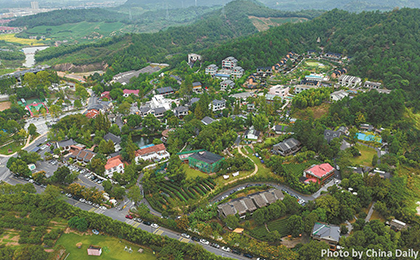



▲ A panoramic view of the Xiao Yin Half-day Village in Anji, Zhejiang province. [China Daily]
5. Cultivating Rural Talent and Attracting Them to Engage in All-around Rural Revitalization.
5.1 Expanding the rural talent pool.
Implement the High-Quality Farmer Training Program and the Rural Industry Revitalization Leader Training Project, strengthening training and guidance for young farmers and new agricultural business entities. Encourage and guide young people to develop and start businesses in rural areas, enhance the cultivation of agricultural and rural technology leaders and young talents, and promote the integration of agricultural education with practical production. Implement the Special Agricultural Technology Extension Service Program and build a rural public service and governance talent team.
5.2 Improving the rural talent training system.
Improve the system of agriculture-related higher education, optimize and enhance vocational education, and encourage qualified village cadres and farmers to apply for vocational colleges. Establish a comprehensive agricultural training system, coordinate various training resources, and implement demand-driven training. Strengthen rural vocational and adult education, and promote the cultivation of digital and e-commerce talent in rural areas.
5.3 Establishing the rural talent support mechanisms.
Establish a regular talent service system for rural areas, support returning personnel, retired military personnel, and retired experts in contributing to all-around rural revitalization, and improve the county-level talent coordination system. Promote support from science, medical, and educational personnel, and implemented the Western Volunteer Program for college students. Develop a graded and classified evaluation system for rural talent, encourage various talents to engage in rural development, and include eligible persons returning to their hometowns for entrepreneurial employment in the scope of agriculture-related training.
6. Enriching Rural Culture and Fostering Civilized Rural Customs in the New Era.
6.1 Enhancing the spiritual outlook of villages.
Implement the rural civilization construction initiatives, and strengthen the cultural cultivation, practical civilization, and civilized community creation. Promote legal and scientific education while opposing feudal superstitions. Carry out honesty propaganda and education, enhance the ideological and moral education of young people, and reinforce the protection of minors on the Internet. Guide villagers to follow rules and regulations, and improve both binding norms and recommended standards.
6.2 Reshaping the rural cultural environment.
Optimize the supply mechanism for cultural services and products, promote rural cultural volunteer services, and organize community-based cultural and sports activities with strong agricultural characteristics. Improve the public cultural service system, implement cultural benefit programs, explore mechanisms for cultivating and guiding mass cultural and artistic groups, and promote the reform and innovation of rural libraries.
6.3 Enhancing the influence of rural culture.
Promote outstanding traditional Chinese culture, strengthen the conservation and inheritance of traditional villages, and enhance the protection and utilization of cultural relics and intangible cultural heritage. Implement the traditional craft revitalization project and carry out the revitalization of old and valuable trees and the protection of clusters of old trees. Promote the revitalization of traditional Chinese festivals and organize the China Farmers’ Harvest Festival. Cultivate and grow the rural cultural industry, improve the quality and efficiency of rural tourism, and accelerate the digital empowerment of rural cultural industries.
7. Deepening Rural Ecological Civilization Construction and Accelerating the Green Transition in Development.
7.1 Accelerating the green and low-carbon agricultural development.
Promote green production technologies, integrate green pest control with unified pest prevention and management, and develop water-saving and drought-resistant agriculture. Strengthen the prevention and control of agricultural source pollution, develop ecological circular agriculture, and enhance monitoring and evaluation of agricultural pollution. Gradually reduce agricultural emissions and increase carbon sequestration by promoting no-till and minimum-till seeding techniques.
7.2 Improving the rural ecological environment.
Promote the conservation and restoration of farmland, grasslands, forests, rivers, and lakes, improve the system for crop rotation and fallow land management, and integrate the management of natural and public welfare forests. Carry out vital projects for the protection and restoration of key ecosystems while implementing biodiversity conservation projects, and strengthening the protection of aquatic wildlife. Address pressing ecological and environmental issues in rural areas and establish a rural ecological environment monitoring and evaluation system.
7.3 Improving the realization mechanism of ecological product value.
Implement natural resource asset rights, improve investigation, monitoring, and evaluation systems, and establish trading mechanisms for carbon emission rights, sewage rights, and water rights. Improve the ecological protection compensation system and promote comprehensive ecological compensation. Develop and commercialize rural ecological products, create regional public brands for ecological products, and increase green financial support.
Source:<https://www.gov.cn/zhengce/202501/content_7000499.htm>
Editor & Translator: GUO Xinxin